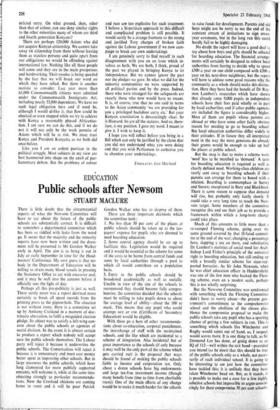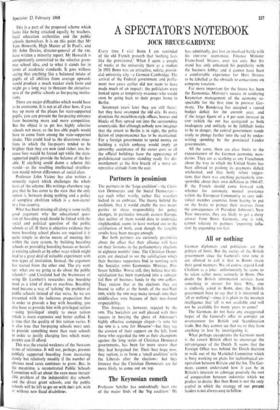Public schools after Newsom
EDUCATION STUART MACLURE
There is little doubt that the circumstantial reports of what the Newsom Committee will have to say about the future of the public schools are substantially correct. It is difficult to remember a departmental committee which has been so riddled with leaks from the word go. It seems that the majority and the minority reports have now been written and the docu- ment will be presented to Mr Gordon Walker early in April. The aim is to bring it out in July or early September in time for the Head- masters' Conference. My own guess is that no- body in the Department of Education will be willing to strain many blood vessels in pressing the Stationery Office to act with excessive zeal, and it may be well into the autumn before it officially sees the light of day.
Perhaps all this pre-publicity is just as well. There surely never was a report destined more certainly to break all speed records from the printing press to the pigeon-hole. The situation is not without irony. Here is a committee set up by Anthony Crosland in a moment of doc- trinaire aberration, to fulfil a misguided election pledge. Its object was to satisfy a left-wing con- cern about the public schools as agencies of social division. In the event it is almost certain to produce a report which nobody will accept save the public schools themselves. The Labour party will reject it because it underwrites the public schools. The Conservatives will reject it because it is unnecessary and must cost money better spent in improving other schools. But in large measures the public schools, which have long clamoured for more publicly supported entrants, will welcome it, while at the same time objecting strongly to particular recommenda- tions. Now the Crosland chickens are coming home to roost and it will be poor Patrick Gordon Walker who has to dispose of them. There are three important decisions which the committee took:
1. No less 'than 50 per cent of the places at public schools should be taken up at the tax- payers' expense for pupils who are deemed to need boarding education.
2. Some central agency should be set up to facilitate this. Legislation would be required and it would be essential to the scheme for some of the costs to be borne from central funds and some by local authorities through a pool to which all would contribute on a population basis.
3. Entry to the public schools should be broadened academically as well as socially. Unable in view of the size of the schools to recommend they should become fully compre- hensive, the committee decided that the schools must be willing to take pupils down to about the average level of ability—about the 100 ro mark. This means that any pupil who could attempt GCE or CSE (Certificate of Secondary Education) would be eligible.
With these go a host of other recommenda- tions about co-education, corporal punishment, the interchange of staff with the maintained schools, and the like which are incidental to a scheme of integration. Also incidental but of great importance to the schools (if only because it may well be the only part of the scheme which gets carried out) is the proposal that ways should be found of making the public schools liable to income and corporation tax. Only about a dozen schools have big endowments and large tax-free investment income (though many benefit .from time to time from charitable trusts). One of the main effects of any change would be to make it much harder for the schools to raise funds for development. Parents and old boys might not be sorry to see the end of the constant stream of invitations to sign seven- • year covenants, but in the long run this could hardly fail to be highly damaging.
No doubt the report will have a good deal to say about how boys and girls should be selected for boarding education. The financial arrange- ments will certainly be designed to relieve local authorities from having to decide why to spend f500 a year on one child compared with £200 a year on his next-door neighbour, but the report will have to adduce some good reasons why the community as a whole should make this distine tion. Here they have had the benefit of Dr Roy ston Lambert's researches which have shown that already some 9,000 pupils in independent schools have their fees paid wholly or in part by local authorities, and if other public agencies are included the figure is considerably higher Most of them are pupils whose parents are abroad or who have some other fairly obvious reason for needing to go to boarding schoo! But local education authorities differ widely in their attitudes. If in future they all interpreted need in the way the most generous do already their grants would be enough' to take up half the places at public school.
But the snag is that to make a scheme work `need' has to be matched to 'demand.' A Last,: for boarding education is required as well as clearly defined need. Working-class children are rarely sent away to boarding schools if their parents can arrange for them to board with :t relation. Boarding is commonplace in Surrey and Sussex; exceptional in Bury and Blackburn. There is some reason to suppose that demand will rise, but probably only fairly slowly. It could take a very long time to reach the New- som target. Some members of the committee recognise this and see their job as to provide -r framework within which a long-term change could take place.
Much of this amounts to little more than a re-vamped Fleming scheme, going .over the same ground covered by that ill-fated commit- tee at the end of the war; changing a percentage here, slapping a tax on there, and substitutin:„ Dr Lambert's statistics of social need for Arch- bishop Lord Fisher's principle of the universal right to boarding education, but still ending up with a broadly similar scheme for state-sup- ported bursaries. As Sir John Newsom, when he was chief education officer in Huddersfield, was one of the few men who backed the Flem- ing scheme, even on a modest scale, perhaps this is not wholly surprising.
But the Newsom Committee was confronted with something which the Fleming Committee didn't have to worry about—the present gov- ernment's commitment to the comprehensive school and the abolition of the eleven plus. Hence the compromise proposal to make the public schools take any pupil who has a sporting chance of getting a few subjects in CSE. This is something which schools like Winchester and
Rugby would reject out of hand, as, I suspect would scores more. It is one thing to talk, as Sir
Desmond Lee has done, of going down to an IQ of 112—well within the GCE band—provided you intend (as he does) that this should be true of the public schools only as a whole, not neces- sarily of each individual school. It is going to
be interesting to see just how the committee have tackled this; it is unlikely that they have taken Winchester head on. But, as it stands, it is possible to make out a case for a few highl) selective schools but impossible to argue convin- cingly for these compromise 50 per cent schoolf. This is a part of the proposed scheme which looks like being attacked equally by teachers, local education authorities and the public schools themselves. It is on this point that Mr Tom Howarth, High Master of St Paul's, and Mr John Davies, director-general of the cm, have written a minority report, Mr Howarth is unrepentantly committed to the selective gram- mar school idea, and to what it stands for in terms of academic standards. It goes without saying that anything like a balanced intake of pupils of all abilities from average upwards would produce a much weaker sixth form and might go a long way to threaten the attractive- ness of the public schools as fee-paying institu- tions.
There are major difficulties which would have to be overcome. It is not at all clear how, if you buy up more of the places for state-supported pupils, you can prevent the fee-paying entrance from becoming more and more .competitive. But the object is to get less highly selective schools not more, so the less able pupils would have to come from among the state-supported intake. This could lead to the disastrous-situa- tions in which the-fee-payers tended to be brighter than they are now (and richer, too, be- cause fees• would be forced up) while the state- supported pupils provide the balance of the less able. If anything could damn a scheme this would—as the resulting intellectual stratifica- tion would mirror differences of social class.
Professor John Vaizey has also written a minority report which challenges the whole basis of the scheme. His writings elsewhere sug- gest that he has come to the view that the only option is between doing nothing and a policy of complete abolition which is a non-starter in a free country.
What has been missing all along is some really good argument why the educational ques- tion of boarding need should be linked with the social and political question of the public schools at all. If there is objective evidence that more boarding school places are required it is quite simple to devise means of meeting this within the state system, by building boarding schools or providing boarding houses or hostels at existing schools or by other ways which might lead to a great deal of valuable experiment with new types of institution. Instead, the argument has started from the other end. The cry went up: what are we going to do about the public schools?—and Crosland had the brainwave of using Dr Lambert's researches into boarding need as a kind of deus ex machina. Boarding need became a way of 'solving' the problem of public schools instead of vice versa. So we are presented with the ludicrous proposition that in order to provide a boy with boarding, you also have to provide him with privileged tuition —using 'privileged' simply to mean tuition which is more expensive and better staffed. It is true that the quality of this tuition varies. It is also true that fee-paying schools must seek to provide something more than state schools in order to justify, charging fees which many parents can ill afford.
This was the crucial weakness of the Newsom terms of reference. It will not, perhaps„prevent publicly supported boarding from increasing slowly but relatively steadily if the number of obvious need cases continues to grow. But, in the meantime, a reconstituted Public Schools Committee will set about the even more intract- able problem of the independent day schools and the direct grant schools, and the public schools will be left to get on -with their job, with or without new-fiscal disabilities. -



































 Previous page
Previous page